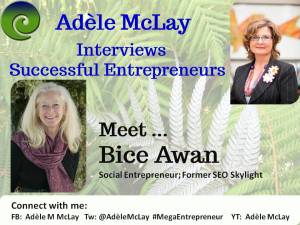Successful Entrepreneurs’ Stories : Meet Veronica Pullen
Veronica Pullen
Social Marketing Queen
Imagine having Asperger’s Syndrome, rheumatoid arthritis, hearing difficulties, an eyesight issue which means you are blind at night, and mobility issues. What might life hold for you? Meet Veronica Pullen. She has all those health issues, but that hasn’t stopped her being a hugely successful entrepreneur based in the United Kingdom. Because of her ailments, Veronica began networking online 18 years ago; through internet chat rooms and forums, she made friends. A book keeper by day, online networker by night, Veronica realised that business people were starting to wonder how to use the online world to network – something she had been doing for years. So, a new social media business was born.
Veronica admits she did undertake some social media training, but soon realised she knew as much as the trainers. What she needed to learn was how to build and run a business to support her social media skill set. Veronica is passionate about learning, so even today, while running a hugely successful business, she is continuing to explore new ways to develop and run her business.
At first Veronica tried to ignore her health challenges, thinking that if she just focused on her expertise in social media, no one would pay any attention to her health issues. She was wrong. By not acknowledging her issues, Veronica found she alienated her audience. Once she began to ‘weave in’ her health challenges, people started to accept her as they respected the personal challenges she had overcome, and continues to overcome to this day.
As you might expect, being a social marketing queen, Veronica has built her customer base via social media. The friends she had developed became her first customers when she established her new business, and in turn they continue to refer her to their friends. Now Veronica has social media customers all over the world, and some very well known names have their social media activity managed by Veronica and her team.
Veronica has been shortlisted for and won various business awards. She credits a lot of her business success to having mentors and coaches supporting her. They teach her and she always implements their teachings. She also continues to participate in Mastermind type coaching groups with others in business. These environments ensure Veronica continues down the right path in her business. Veronica’s greatest joy in business is that she owns and runs a business that is an extension of herself. As she says, she “shows up as Veronica”! She gets paid to talk about and teach the things she lives for. For Veronica, there is no distinction between work and play. It is all play!
To be successful in business, Veronica believes:
1) Do something in business that you love. If you are not passionate about it, you will not achieve the success you aspire to achieve.
2) Always make sure you are networking with people who are more successful than you. If you want to grow your business, look at the people who are around you, and make sure they are helping you to go forward and not holding you back.
3) That all businesses need to embrace the power of social media to support the growth of their business.
Adèle’s Note:
I had the pleasure of interviewing Veronica Pullen for my book: BIG Profits – 12 Strategies To Substantially Grow YOUR Business Profits, in which Veronica features.
Veronica is amazing. She decided early on that she would not let her health issues affect the quality of her life, and she hasn’t. Veronica has embraced her ailments, and has used them to her advantage. She has a hugely successful international business, and aspires to achieve even more. She has set herself some significant goals for the next five years, and is on track to achieve them. Veronica has found that she enjoys the life of a celebrity and being recognised, so has set her sights on presenting her material on the stage to larger groups of people. Go Veronica. You are an inspiration.
You can listen to the original Interview with Veronica Pullen here:
![]()
![]()
To connect with Veronica Pullen:
![]()
![]()
![]()
Adèle hosts an interview series entitled:
• Successful Entrepreneurs’ Stories : Adèle McLay Interviews…..
• Business Success Tips : Adèle McLay Interviews …..
…where she interviews successful entrepreneurs from around the world, asking them to share their entrepreneurial stories, and other business ‘subject matter experts’ who share business success tips. If you would like to be part of Adèle’s success community and receive the interviews and much more directly to your inbox, please click here.
Listen to more Successful Entrepreneurs and be inspired in the Successful Entrepreneurs’ Stories: Adèle McLay Interviews….. YouTube and Podcast series:
Successful Entrepreneurs’ Stories : Adèle McLay Interviews Phil Turner
Successful Entrepreneurs’ Stories : Adèle McLay Interviews Rachelle Harte
Successful Entrepreneurs’ Stories : Adèle McLay Interviews Bice Awan
Successful Entrepreneurs’ Stories : Adèle McLay Interviews Andy Harrington
Successful Entrepreneurs’ Stories : Adèle McLay Interviews Shannon Lea Reynolds
Successful Entrepreneurs’ Stories : Adèle McLay Interviews Rick Tobin
Successful Entrepreneurs’ Stories: Adèle McLay Interviews Dale Murray, CBE
Successful Entrepreneurs’ Stories : Adèle McLay Interviews Steve Pollard
Successful Entrepreneurs’ Stories : Adèle McLay Interviews Ed McLaughlin
Successful Entrepreneurs Stories : Adèle McLay Interviews Stuart Norris
Successful Entrepreneurs Stories : Adèle McLay Interviews Zoe Cunningham
Successful Entrepreneurs Stories : Adèle McLay Interviews Theresa Gattung
Successful Entrepreneurs Stories : Adèle McLay Interviews Zach Falconer-Barfield
Successful Entrepreneurs Stories : Adèle McLay Interviews Dallas Hardcastle
Successful Entrepreneurs Stories : Adèle McLay Interviews Sophie Burnett
Successful Entrepreneurs Stories : Adèle McLay Interviews Martin Worner
Successful Entrepreneurs Stories : Adèle McLay Interviews Mark Attwood
Successful Entrepreneurs Stories : Adèle McLay Interviews Sharryn Waters
Successful Entrepreneurs Stories : Adèle McLay Interviews Bruce Walker
Successful Entrepreneurs Stories : Adèle McLay Interviews Mark Cottle
Successful Entrepreneurs Stories : Adèle McLay Interviews Mark Williams
Other articles on What Makes Successful Entrepreneurs:
Seven Secrets of Super Successful Entrepreneurs
Entrepreneurship vs The Meaning of Life
Mega Entrepreneur Defined!
Supercharge Your Profitable Business!
Leadership Qualities
What Makes Great Entrepreneurial Leaders?
All Work + Little Play = Boring!
Entrepreneurial Success without Fulfilment: Who Wants That?
Millionaire Mindset
NZ Entrepreneurship Success









